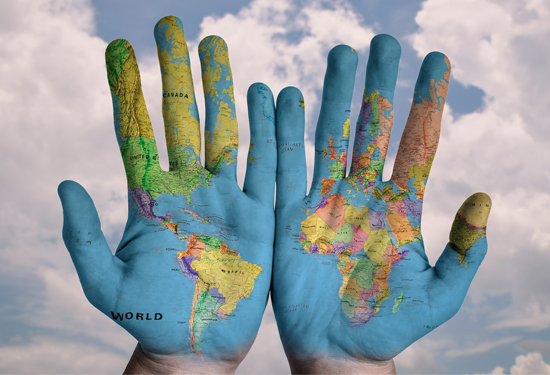Our Student Social Media Assistant Maddie investigates, what makes us global citizens? And how learning a language could be the key to accepting each other and embracing cultures.
Are you a global citizen? I believe we all are without necessarily realising. But do we celebrate diversity enough? Do we understand different cultures? Embracing diversity comes down to embracing human kind. Regardless of gender, religion, ethnicity, beliefs, social and economical position, we are all humans and share a certain bond.
Globalisation means that it’s now possible for people from all walks of life and cultures to live all over the world. So how come we are so close to one another, yet so far away at the same time? How could we all embrace diversity more?
A great way to immerse yourself in a different culture is to learn a foreign language. Learning a language is not just about learning words and how they make sense when put in sentence, but rather learning the culture of the country as well. If language is what holds you back, then give learning a try!
Did you know?
- Switching between different languages is in itself an exercise for the brain?
- The onset of dementia is triggered on average four years later in bilinguals than in monolinguals?
- Bilinguals can often filter out irrelevant information and switch faster between tasks?
- Speaking a foreign language can significantly increase your employment prospects?
How could you learn a new language?
The ‘Duolingo’ app does quite a job, however, if you have foreign friends, why not ask them to communicate with you in their native language? Or even better, if you’re a huge fan of travelling (just like I am!), then I challenge you to get ‘lost’ in other countries and learn their language from the locals. I tried it, and trust me, it works! What better way to make new friends around the world?!
 For an interesting talk on languages, why not give Tim Doner’s TedxTeen talk a listen?
For an interesting talk on languages, why not give Tim Doner’s TedxTeen talk a listen?
Let me ask you…
Did you know that in any face-to-face communication only 7% of the actual message is conveyed by words? 38% of the meaning is taken by paralinguistics (the way that we say things) and 55% is in fact non-verbal communication attributed to gestures and facial expression.
So in fact it’s not always what we are saying that matters to the greatest extent, but how we are saying it and above all, what our body is communicating. This brings me to the next point:
Body language
Why is body language crucially important in embracing diversity? Although we live in a globalised world, when different cultures come together they each bring something unique, something different. We all share different traditions and habits, which might be new for somebody in a different culture. How confident are you at interacting with someone from a different culture without fearing you’ll give the wrong first impression?
Did you know?
- While in most cultures the O.K. sign (formed by uniting the thumb and the forefinger to form a circle) means ‘everything’s fine’, in France it means ‘no value’. While in countries like Russia and Spain it is an indecent sign!
- The way to greet somebody in the UK is to shake their hand, while in France people greet each other by kissing on both cheeks, and in East Asian culture a bow is more common.
- In Italy the use of broad moves of the arms is considered normal, while in Japan this is considered impolite.
- Sitting cross-legged is widespread in the US and European countries, yet it is seen as disrespectful in Asian cultures.
- Eye contact is deemed as inappropriate in the Middle East, but it is perceived as a sign of confidence in the US and Western Europe.
- Mastering the art of body language could not only teach you about your own gestures, but also broaden your ability to read others’ and understand them more effectively.
You can learn about effective body language here.
Travel, learn, immerse yourself in other cultures and embrace diversity, and you’ll be a global citizen!








